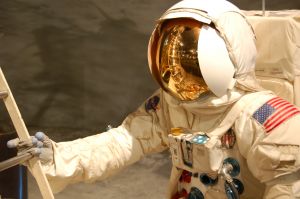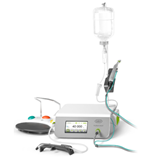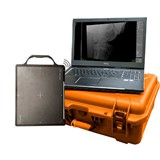The space travellers, zipped into a sleeping bag, battle the discomfort of weightlessness as they try to drift into slumber.
Often they report feeling too hot, too cold, or the environment is simply too noisy to get forty winks.
Resorting to sleep medication is common, says Dr Laura Barger from Harvard Medical School's Division of Sleep Medicine.
Dr Barger, who is visiting Australia to work with Monash University sleep researchers, has studied astronauts on space shuttle and International Space Station missions for the past decade.
A former Air Force Lieutenant Colonel, Dr Barger said space shuttle astronauts orbiting the earth also battle a light and dark cycle that alternates every 90 minutes.
In contrast, astronauts at the international space station can stick to similar night and day patterns as on earth.
They also have their own private sleeping quarters where they can hang their sleeping bag, Dr Barger said.
But their sleep patterns can be interrupted by the arrival of a space shuttle or supply ships at the station, forcing the astronauts to switch around their day and night patterns so they are awake when the space crafts dock.
"It's a real environmental challenge (to sleep), in that some astronauts tell us it's too hot, too cold, it can be a noisy environment, it can be physical discomfort," Dr Barger told reporters.
"Those environmental challenges are some that have been around since the Apollo era.
"Some of the first astronauts on the moon, Neil Armstrong and Buzz Aldrin, complained about being too cold and the light too bright to sleep."
Dr Barger and her colleagues have studied astronauts aboard 26 space shuttle missions and 21 workers on the international space station.
The results are yet to be published, but previous studies have shown astronauts only get about six hours of sleep a night.
Dr Barger's research for the Harvard Work Hours Health and Safety Group focuses on the health and safety risks associated with unusual or shift work hours.
She has also studied medical residents, police officers, firefighters, federal air marshals and mission controllers supporting the Phoenix Mars Lander mission.
Dr Barger, working in collaboration with Monash University Associate Professor Shantha Rajaratnamwe, screened almost 5000 police officers for sleep disorders and found those who experienced disrupted sleep were unhealthier, and had more adverse performance and safety outcomes, than those who were not sleep deprived.
Medical residents working extended 24-hour shifts crashed their cars driving home twice as often compared to those on normal shifts, Dr Barger found.
"Across all occupations, one safety outcome we measure is the incidence of motor vehicle crashes," Dr Barger said.
"One goal of the Harvard Work Hours Health and Safety Group is to come up with a strategy for future research examining drowsy driving."
- Suppliers
- New to MedicalSearch? Book a Demo
- Advertise with us
- Login
- Email Marketing
- Buyers
- Get Quotes
- Articles & Ideas
- Login
- Subscribe to newsletter
- My Details
- Get Quotes
- Accident & Emergency Care
- Aged Care & Disability
- Anaesthesia & Respiratory Care
- Beauty & Wellness
- Cardiology & Cardiac Surgery
- Commercial Cleaning & Laundry Supplies
- Dental Care & Oral Surgery
- Diagnostic Instruments & Medical Imaging
- Disinfection & Sterilisation
- ENT & Audiology
- Gynaecology & Obstetrics
- Homecare & Consumer Medical
- Hospital Equipment & Supplies
- Intensive Care Unit
- Laboratory & Pathology
- Medical Apparel
- Medical Devices & Products
- Medical Fridges & Freezers
- Medical Storage & Filing
- Medical Waste Management
- Optometry & Ophthalmology
- Orthopaedics & Podiatry
- Paediatrics & Neonatology
- Patient Monitoring & Management
- Physiotherapy & Rehabilitation
- PPE & Infection Control
- Single Use Medical Consumables
- Surgical Tools & Supplies
- Treatment Beds, Tables & Couches
- Veterinary Equipment
- Wheelchairs & Mobility Aids
- Get Quotes
- Accident & Emergency Care
- Aged Care & Disability
- Anaesthesia & Respiratory Care
- Beauty & Wellness
- Cardiology & Cardiac Surgery
- Commercial Cleaning & Laundry Supplies
- Dental Care & Oral Surgery
- Diagnostic Instruments & Medical Imaging
- Disinfection & Sterilisation
- ENT & Audiology
- Gynaecology & Obstetrics
- Homecare & Consumer Medical
- Hospital Equipment & Supplies
- Intensive Care Unit
- Laboratory & Pathology
- Medical Apparel
- Medical Devices & Products
- Medical Fridges & Freezers
- Medical Storage & Filing
- Medical Waste Management
- Optometry & Ophthalmology
- Orthopaedics & Podiatry
- Paediatrics & Neonatology
- Patient Monitoring & Management
- Physiotherapy & Rehabilitation
- PPE & Infection Control
- Single Use Medical Consumables
- Surgical Tools & Supplies
- Treatment Beds, Tables & Couches
- Veterinary Equipment
- Wheelchairs & Mobility Aids
Trusted by 740,000 Australian medical buyers
Buyers
- Discover products & solutions
- Login
- Subscribe To Newsletter
- Browse All Products
- Read Articles
Suppliers
Advertise
- Promote your products & solutions
- New to MedicalSearch? Book a Demo
- Login / Forgot Password
- Advertise Your Products
- Success Stories
- Email Marketing
- Suppliers
- Advertise with us
- Login
- Email Marketing
- Buyers
- Get Quotes
- Articles & Ideas
- Login
- Subscribe to newsletter
- My Details
Get Quotes
- Accident & Emergency Care
- Aged Care & Disability
- Anaesthesia & Respiratory Care
- Beauty & Wellness
- Cardiology & Cardiac Surgery
- Commercial Cleaning & Laundry Supplies
- Dental Care & Oral Surgery
- Diagnostic Instruments & Medical Imaging
- Disinfection & Sterilisation
- ENT & Audiology
- Gynaecology & Obstetrics
- Homecare & Consumer Medical
- Hospital Equipment & Supplies
- Intensive Care Unit
- Laboratory & Pathology
- Medical Apparel
- Medical Devices & Products
- Medical Fridges & Freezers
- Medical Storage & Filing
- Medical Waste Management
- Optometry & Ophthalmology
- Orthopaedics & Podiatry
- Paediatrics & Neonatology
- Patient Monitoring & Management
- Physiotherapy & Rehabilitation
- PPE & Infection Control
- Single Use Medical Consumables
- Surgical Tools & Supplies
- Treatment Beds, Tables & Couches
- Veterinary Equipment
- Wheelchairs & Mobility Aids
Get Quotes
- Accident & Emergency Care
- Aged Care & Disability
- Anaesthesia & Respiratory Care
- Beauty & Wellness
- Cardiology & Cardiac Surgery
- Commercial Cleaning & Laundry Supplies
- Dental Care & Oral Surgery
- Diagnostic Instruments & Medical Imaging
- Disinfection & Sterilisation
- ENT & Audiology
- Gynaecology & Obstetrics
- Homecare & Consumer Medical
- Hospital Equipment & Supplies
- Intensive Care Unit
- Laboratory & Pathology
- Medical Apparel
- Medical Devices & Products
- Medical Fridges & Freezers
- Medical Storage & Filing
- Medical Waste Management
- Optometry & Ophthalmology
- Orthopaedics & Podiatry
- Paediatrics & Neonatology
- Patient Monitoring & Management
- Physiotherapy & Rehabilitation
- PPE & Infection Control
- Single Use Medical Consumables
- Surgical Tools & Supplies
- Treatment Beds, Tables & Couches
- Veterinary Equipment
- Wheelchairs & Mobility Aids
Trusted by 740,000 Australian medical buyers








-160x160-state_article-rel-cat.png)











